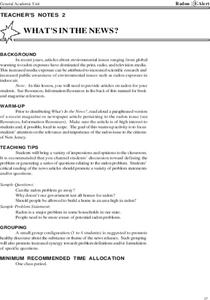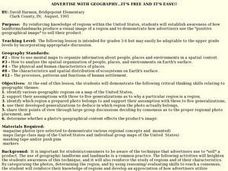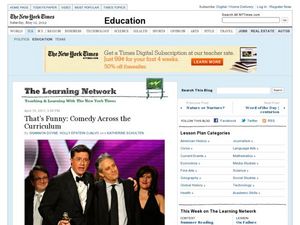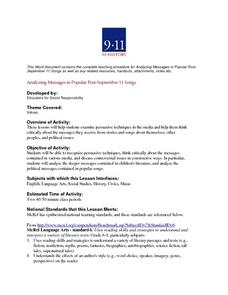Nemours KidsHealth
Screen Time: Grades 6-8
How much screen time is too much screen time? Even before COVID, tweens were spending hours watching TV, playing video games, and connecting with their friends by smartphone and computers. Two activities from Kids Health get young...
Newseum
Slanted Facts and Slippery Numbers
The Internet is known as the information superhighway, but sometimes it's hard to know when to hit the brakes on unreliable sources. Using a well-rounded lesson plan, pupils read and summarize articles about the gender pay gap and...
Anti-Defamation League
Dealing with the Social Pressures that Promote Online Cruelty
Why do people engage in cyberbullying? What can be done about it? These are the questions middle schoolers consider in a very timely lesson. Participants view PSA announcements, read a case study, and participate in scenarios designed to...
Curated OER
Lesson Ten: Your World Without Oil
Learners participate in the World Without Oil game as they examine the effects of a prolonged oil shortage. In this oil shortage lesson plan, students play the online game, World Without Oil, before making an audio clip based on the...
Curated OER
"I'm Not Old Enough to Vote, but If I Was..." Creating Video Public Service Announcements
High schoolers create a short multi-media public service announcement aimed at increasing voter participation after determining how the issues can impact their communities. They apply critical viewing skills while determining the...
Curated OER
What's in the News?
Students discuss any news article or video about the environment. They develop their own questions relating to radon and how it effects people and the environment. They answer each others questions to end the lesson plan.
Curated OER
Advertise With Geography...it's Free And It's Easy!!
Students establish awareness of how landforms/landmarks produce a visual image of a region and demonstrate how advertisers use the "positive geographical image" to sell their product by creating their own advertisements.
Curated OER
Comedy Across the Curriculum
The New York Times Learning Network provides the resources that permit pupils to examine and then write and perform a fake news broadcast in the vein of “The Daily Show” or “Saturday Night Live” Weekend Update. The generated reports...
PBS
President Theodore Roosevelt: Foreign Policy Statesman or Bully?
Can a negative perception of a president's foreign policy harm his or her historical legacy? A project that winds the clock back to the date of Theodore Roosevelt's death puts students at the editorial desk of a fictional newspaper....
Curated OER
It's All Greek to Me!
While the ideas for Ancient Greek research are solid, there is little detail to help make your job easier. The focus here is familiarizing your class with online databases and print resources in their school library. After direct...
Curated OER
What's Missing? Making Room for Multiple Perspectives
Students identify missing characters from a text, particularly a school text. They increase critical thinking by supplying missing perspectives in a text an build empathy through surveying different points of view. They reflect on the...
Curated OER
Hidden Messages: The Growth of Product Placement
Students identify product placements they see in TV programs and movies. They build awareness of the pervasiveness of advertising in their culture. They develop critical skills necessary to think independently in a media saturated...
Curated OER
911 As History
Students recognize persuasive techniques, think criticaly about the messages contained in various media, and discuss controversial issues in constructive ways. They analyze the deeper messages contained in children's literature, and...
US Holocaust Museum
Nazi Olympics: Berlin 1936
The Olympics are about more than sports—at times, the games are also a place of racism and prejudice! Pupils investigate the 1936 Olympics in Berlin, Germany. They analyze the meaning behind the materials included in the United States...
Curated OER
Power, Persuasion & Propaganda: Exploring Multiple Motives
Students recognize different motives even in non-commercial media. They analyze the role of media in a democratic society and wrestle with ethical issues concerning media and the public good. They create a media message with one or more...
Curated OER
Scientific Detectives
Students examine the legitimacy of advertisers' claims about products using science and critical thinking. They view and discuss ads, read a case study, and conduct an experiment to demonstrate whether a product lives up to its claims.
Curated OER
The Big Mo
Young scholars develop media literacy and critical thinking skills to analyze trends and determine the extent to which their decisions may be influenced by manipulation. They examine the mathematics of trends and write about a time they...
Foreign Policy Research Institute
Teaching the 9/11 Anniversary
Here is a lesson on terrorism and 9/11. While outdated, it could be easily revised for today's teens. It includes targeted vocabulary, a background information activity, critical thinking questions, and step-by-step procedures for...
Curated OER
Creating Scrolls Based on the illustrated TALE OF GENJI
Learners identify formal elements that characterize the scroll, work in a variety of media, from traditional to digital, to create their own scrolls, work into digital printout with at least two media, and engage in meaningful critiques...
Curated OER
Stereotypes: More Than Meets the Eye
Young scholars explore the concept of stereotyping. They observe images and media that portray the Middle East and its inhabitants. Students make determinations about the impact of the images on their perceptions. They consider ways...
Curated OER
Divorce And Stepfamilies: Breaking Apart, Coming Together
Students view a PBS "In the Mix" video about the challenges teens face when their parents divorce and/or remarry. They participate in a class discussion about the video, role-play related situations and explore media depictions of...
Curated OER
Objective Versus Subjective
Students examine the difference between subjective and objective statements, newscasts, and media. They discover that subjective is opinion based and objective is fact based.
Curated OER
Growing a Citizen
Students analyze messages and values associated with civic engagement present in the media. They analyze the local community's promotion of values associated with civic engagement by conducting investigative research. They hypothesize...
Beacon Learning Center
Spotted Stones Linked Just Right
Discover how to play the game of dominoes using mental math skills to solve equations that earn points. Pupils become fast critical thinkers in determining which unknown addend tally up points in their favor.

























